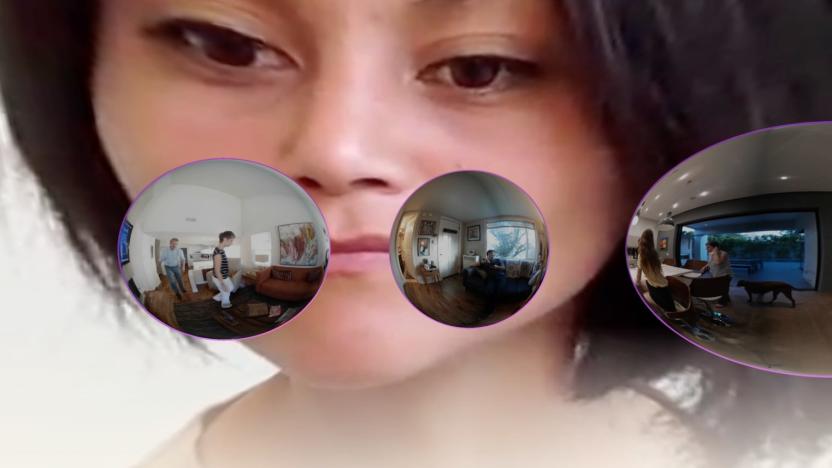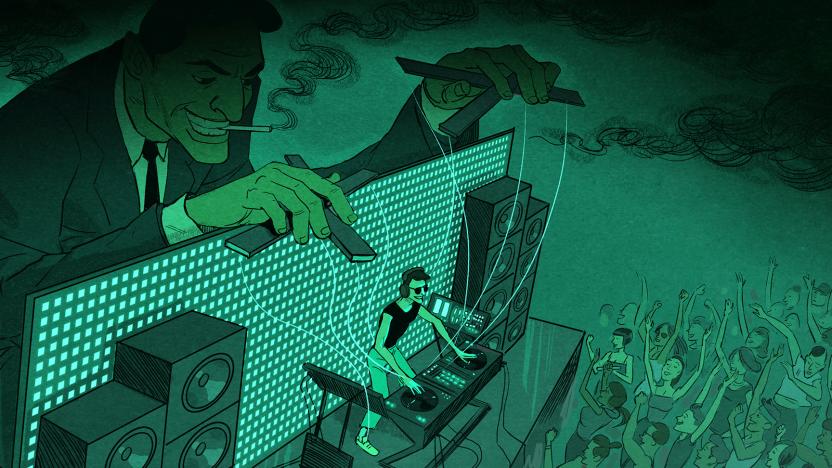longread
Latest

Four people are allowing strangers to control their smart homes
For the next seven weeks, anyone who's inclined can go to 205 Hudson Street in New York City and take over someone else's apartment. Smart devices like the kettles, lighting and speakers of four homes connect directly to laptops in the corner of an art gallery. Cameras are trained on bathrooms, kitchens and living areas. Visitors can sit down and become a human Alexa, playing music, eavesdropping on conversations through microphones and communicating with the inhabitants via text-to-speech.

Blockchain Wikipedia is a dish best served cold
"You really shouldn't be interviewing me. I don't want to fuck it all up again." We're standing in a greenroom for panelists at StartEngine ICO 2.0, a blockchain conference held in Santa Monica, California, in April 2018. Mahbod Moghadam grabs me and insists, "Really, don't interview me. Do this interview entirely on Larry Sanger." Moghadam, 36, the co-founder of lyrics annotation and media site Genius, is referring to Larry Sanger, 50, the co-founder of Wikipedia. Both were ousted from their respective sites -- Moghadam was forced to resign, Sanger was laid off -- and in the years since, both have traded shots with their intellectual spawn. They're now executives at Everipedia, a blockchain-based encyclopedia and competitor to Wikipedia. In the past year, Everipedia has achieved several milestones. It raised $30 million from Galaxy Digital. It decentralized and became the largest project on the EOS blockchain. As of January 2019, Everipedia is the largest English-language encyclopedia to ever exist -- though, as Wikipedia notes, the majority of articles are clones of Wikipedia articles. Moghadam mills about the greenroom, sunglassed and ebullient. He tells panelists that they'll receive a wiki page afterward or that they already have a wiki. He explains the slang meaning of "Chad": a tall, suave, alpha-looking guy, which most crypto-attendees are decidedly not. "And then 'Thot' is the female version of Chad," he jokes. Finally, an usher arrives to escort the group out. "Wish me luck," Moghadam says, and walks onto the stage.

Russian spam accounts are still a big problem for Reddit
This article was produced in partnership with Point, a YouTube channel for investigative journalism. Last September, a Reddit user called DivestTrump uploaded a detailed report to Reddit about suspicious political posts that targeted the site's main pro-Trump discussion forum. The content chiefly originated from two websites, brutalist.press and usareally.com, which have both been linked to Russia's Internet Research Agency and individuals under investigation by Robert Mueller's FBI probe. But it turns out that's just the tip of the iceberg; tens of millions of reddit users could have been influenced. In a joint investigation, Point and Engadget have learned that at least three additional domains — alt-right.com, veteranstoday.com and southfront.org — are also targeting r/The_Donald and other conservative subreddits in similar ways.

The rise and fall of rocket mail
As you read this, countless cards, letters and packages are en route to delivery destinations across the globe. We rarely think about the logistics involved in international mail crossing land and sea, country borders and continents, because we don't have to. We simply take our item to the nearest postal service branch, pay an acceptable conveyance fee, and within a week or sooner, that item can end up on the other side of the world. But some two hundred years ago, eccentric minds were devising ways of cutting international delivery times to hours or even minutes. Their method? Rockets.

When esports blew up, DDR moved to the suburbs
Even in a packed arcade, David Maiman stands out from the crowd. He's wearing a black T-shirt with multicolor DDR arrows darting across the front, his long, dark hair curling down to his shoulders. As he walks into his local arcade in suburban Long Island, he's almost like a celebrity, shaking hands with the manager, snapping selfies with fellow players and cheering on his friends as they set high scores. "Rhythm games are social," says Maiman, traces of a New York accent in his voice. "That's what makes DDR, and our community, so special."

Tech and tariffs in Sin City
Last week, tens of thousands of people flowed through a congested walkway on their way to see the latest and greatest tech at the Consumer Electronics Show. In years past, this hallway, which connects the Central Hall at the Las Vegas Convention Center to the South Hall, was generally free of any displays, with just a few couches pushed up against the wall. This year, however, a giant phone sat near the middle, off to the side of the aisle, with an approximately five-by-three sign proclaiming "Tariffs are taxes."

The drop
When Nike launched its Air Jordan XI "Concord," in 2011, there were incidents of violence reported at several shopping malls in the US. Back then, most shoe stores sold pairs on a first-come, first-served basis, which led to physical fights between people who were trying to line up outside their local shop. A lot has changed. Over the past few years, sportswear giants like Nike and Adidas have turned to technology to make sneaker shopping safer, particularly for highly coveted models. And there's no better example of this digital-first strategy than the drop of the long-awaited 2018 edition of the Concord XIs, which re-released on December 8th without any chaos, thanks in large part to mobile apps like Nike's SNKRS.

Speculative gadgets at the Future Interfaces Group
To try to get a glimpse of the everyday devices we could be using a decade from now, there are worse places to look than inside the Future Interfaces Group (FIG) lab at Carnegie Mellon University. During a recent visit to Pittsburgh by Engadget, PhD student Gierad Laput put on a smartwatch and touched a Macbook Pro, then an electric drill, then a door knob. The moment his skin pressed against each, the name of the object popped up on an adjacent computer screen. Each item had emitted a unique electromagnetic signal which flowed through Laput's body, to be picked up by the sensor on his watch.

Inside Chronicle, Alphabet’s cybersecurity moonshot
Fifteen years ago, cybersecurity could be boiled down to a simple strategy: Secure the perimeter. Experts fought against malware and other nefarious code by implementing firewalls and other point-of-entry defenses. Since then, however, companies have moved their operations online and allowed employees to bring their own devices (BYOD) to work. The so-called perimeter has dissolved in the process, forcing security practitioners to prioritize tracking, understanding and ultimately making judgments about the information flowing both inside and outside of their company.

Hacking inner peace
1. Science class The principal calls this a mindful school. Johane Ligondé is effusively warm but with the kind of emotional solidity you'd expect from someone who wakes each morning to manage more than 1,000 kids at the only public middle school in the village of Freeport in Long Island, New York. She is also an aromatherapist and life coach who hangs a sign reading "I AM AN OPTIMIST" in her windowless office. At John W. Dodd Middle School, some of the students' primary struggles are common to many young teenagers: depression, anxiety, self-harm and the looming shadow of sudden violence. So every morning during homeroom, a student or staff member leads the entire building through eight minutes of breathing meditation over the PA system. In detention, students are "invited," Ligondé said, to do mindfulness exercises, "so it's not just a space for punishment, it's a space for reflection." A "social-emotional learning curriculum" has been introduced, teaching them conflict and relationship management.

Death by push notification
Attention is the main prize of the internet. Everyone is fighting for it, and the phone is the prime battleground. The most potent of weapons in this war is the incessant, whining notification trying to pull your attention away from whatever you are actually doing and into some other app. The notification may also be a major source of modern technological madness, due to the harmful cognitive consequences of having one's focus continually shattered and reset. A recent study found that a majority of users who made a deliberate choice to turn their notifications down as part of an enforced break were not likely to turn them back on. This got me wondering: What would happen if I cranked them in the opposite direction? What might I learn about how phones are reshaping minds? What might I learn about my own mind?

Big tobacco's new marketing push: Smartphones, style and EDM
This article was produced in partnership with Point, a YouTube channel for investigative journalism. British American Tobacco (BAT) -- the third-largest publicly traded tobacco company in the world -- is engaged in an elaborate and ethically questionable online-marketing strategy across Europe and Asia. A joint Point and Engadget investigation has found that several BAT brands sponsored music events and created entirely new lifestyle brands that initially seem unrelated to cigarettes. But on closer inspection, they are used to raise awareness of cigarette brands in markets where overt tobacco advertisements are forbidden. Dunhill and Kent cigarettes are among the BAT labels benefitting from spinout brands in South Korea, Romania and Switzerland. However, BAT is not unique in using these tactics in the tobacco industry. When it comes to advertising its tobacco products, BAT's own international-marketing principles are clear about its ethical approach: "We do not engage in undercover marketing activities which seek to disguise the source of the advertising message, or the fact that it is intended to advertise a tobacco brand." In the same document, BAT also promises only to market its product to adult smokers. Separately, in an article on BAT's website, the tobacco company denies pursuing nonsmokers. "We never set out to encourage people to take up smoking cigarettes, or to smoke more."

On the nose
When you are a world-renowned pioneer in smells, it's somewhat inevitable you will end up sticking your face into peculiar places.

With the iPhone XR, Apple broadens its 'best'
The iPhone XR might be the most interesting phone Apple has made in years. Think about it: Apple just released its flagship XS and XS Max to a chorus of positive reviews, and now here it is, a month later, preparing to launch another smartphone that packs many of the same features found in those really expensive ones. For Apple, this is all a little unheard of. To add to the curiosity of it all, the R doesn't mean much either. Phil Schiller, gingerly gripping a cup of coffee across from me, said the letters Apple uses never stand for something specific. But then his voice softened a little as he started to tell me about what the letters mean to him. "I love cars and things that go fast, and R and S are both letters used to denote sport cars that are really extra special," he said with a smile. That's not exactly the answer I was hoping for, but I'm not sure what I should've expected from a) Apple's SVP of global marketing and b) a longtime fan of Porsches and Audis. Of course, Schiller's is just one interpretation, and the iPhone XR lends itself to many. It's the cheap iPhone. It's the depressing iPhone. It's, in my case, the fascinating iPhone. That's all right though: Apple was intent on building the right iPhone for as many people as possible, no matter their outlook. These years of work have led Apple to build one of its best smartphones ever, even if it's a little misunderstood.

The world of 'Guacamelee! 2'
Have you heard the legend of El águila y la serpiente? In a dream, the gods told an Aztec leader to take his people into the wilderness of Central America to look for an eagle grasping a serpent on a prickly pear tree -- one creature that could freely travel between the sky and land consuming another that represented wisdom and rebirth. They wandered, living off fleeting natural resources to survive the changing seasons. That is, until the day they saw an eagle perched on a cactus in the middle of a lake. It was eating a serpent. This was the sign they'd searched for -- the sign they'd found their true home, so the Aztec people built their nation, México-Tenochtitlán on that very lake. Today, we know it as Mexico City. This symbolic battle between eagle and serpent is embedded in the center of Mexico's flag. You can also find it at the heart of Guacamelee! 2, the 2D action-adventure platformer from DrinkBox Studios.

Fox Sports’ new virtual studio runs on Unreal Engine
It's no secret that Epic Games has enabled a number of gaming studios to create more-realistic visuals with its Unreal game engine. Since its debut in 1998, powering the first-person shooter Unreal, the technology has evolved to power hundreds of games, from Fortnite to Street Fighter V, and with that process, the virtual has become increasingly more realistic. Now in its fourth iteration, Unreal Engine is no longer exclusively being used for gaming, as other industries have taken notice of the possibilities. Unreal Engine 4 has become a key element for film and television in recent years, and Fox Sports is using it to power its new, completely virtual studio set. "Virtual sets have been around for quite some time, and we've done our fair share of using them," Zac Fields said. "But it's always been a struggle to give that sense of photo realism." Fields oversees Fox Sports' Graphic Technology and Integration department, which includes the addition of new gear during a studio build. He said the team started thinking about the idea of a virtual set about two years ago. Around 15 months ago, the network started getting staff familiar with the software and began tests. Then last winter, the broadcaster did a virtual show. Fields described this as a "full run-through" of a show on the virtual set that was built in Charlotte, North Carolina.

Catie Cuan’s robot choreography
In a former shipyard in New York City, the contemporary dancer and choreographer Catie Cuan twists and sways her limbs. Her dance partner is 9 feet tall and weighs nearly two-tons: an ABB IRB 6700 robot typically used for the "three Ds" of industrial labor -- tasks that are dull, dirty and dangerous.

A date with my Tinder data
I was on Tinder for almost four years. I'm no longer single, but Tinder and its parent company, Match, still have data on me. I didn't delete my profile -- I didn't even think to -- so using GDPR to request what information they had on me was more exciting, or at least more personal, than doing so for other tech companies and services. On the dating apps, I swear I'd tried to keep it classy. I didn't succeed. According to other writers' requests, asking for your data from Tinder leads to varied results, but with FOI requests and GDPR a persistent issue for all tech companies, the dating app thankfully packages everything into a pretty easy to understand and navigable HTML file.

A popular fetish app stored passwords in plain text
"Pursuant to our records, we have not identified an account associated with [your email address]. In order to enable us to exercise your request to receive access to your personal data, we kindly request the below information (please respond with the below to this email): · The email address you registered with on Whiplr; · Your username on Whiplr; · Your password on Whiplr."

How a data request turned into a data breach
The process was smooth enough, with the right safeguards apparently in place. I emailed the dating app Coffee Meets Bagel to request personal data. Within 24 hours the company asked for a selfie of me holding an ID card and a piece of paper with the words "Coffee Meets Bagel" scrawled on it. Exactly one month later I received an email from Stephen Brandon, the company's data protection officer.













